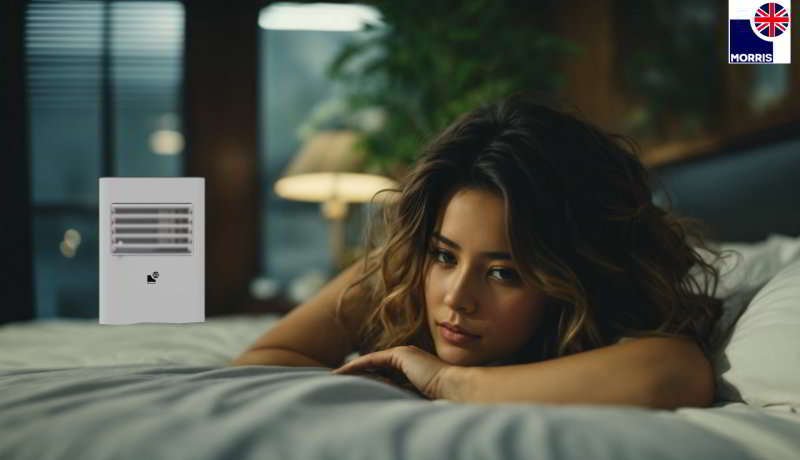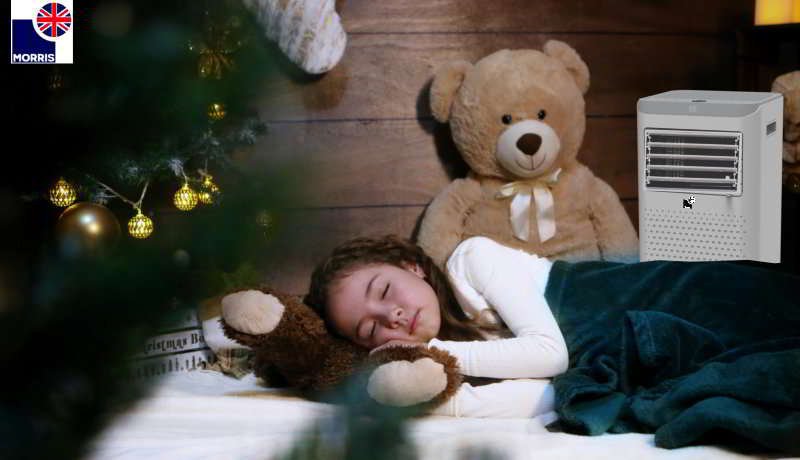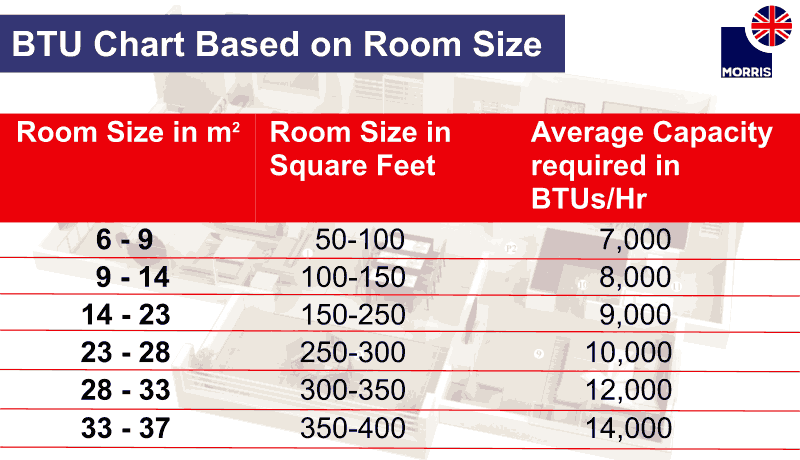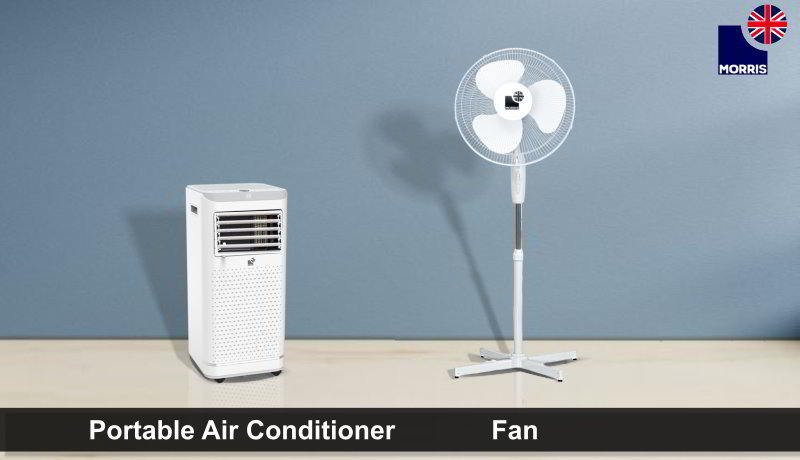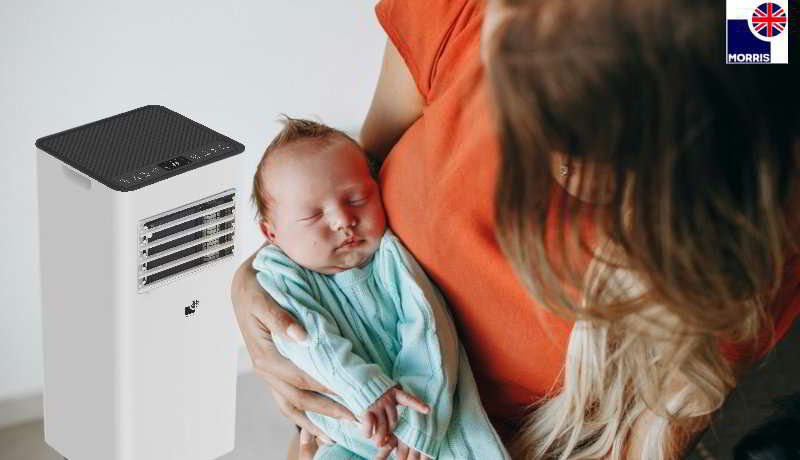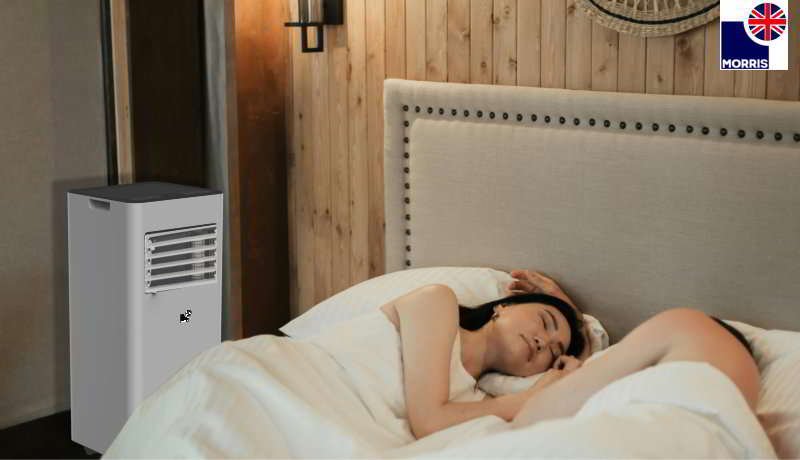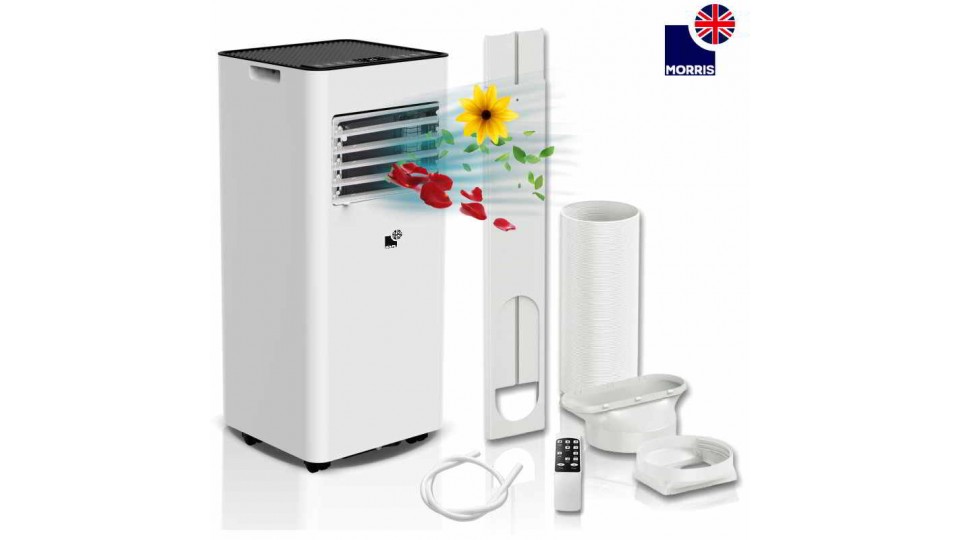Navigating through the varied discussions and opinions on whether sleeping in a room with an air conditioning unit for bedroom affects our health can sometimes be overwhelming. The "Sleep Foundation" suggests that setting the temperature between 15 and 20 degrees Celsius (59 and 68 degrees Fahrenheit) could lead to numerous health benefits like improved mood and weight loss, which are elements we strongly believe in at Morris.
With the rapid evolution of home comfort technologies, the impact of air conditioning on sleep has become a pivotal area of study. Lower humidity and cleaner air, offered by air con units, have shown positive effects on sleep quality by reducing the risk of dehydration and allergen exposure. However, it's crucial to choose the right air conditioning unit for bedroom, taking into account specific needs like room size and individual health considerations.
Understanding How Air Conditioning Impacts Sleep
Understanding how air conditioning impacts sleep involves considering several factors that influence sleep quality. Here are key points to consider:
Temperature and Sleep Quality
The National Sleep Foundation recommends a bedroom temperature between 15 and 20 degrees Celsius (60 and 67 degrees Fahrenheit) for optimal sleep, achievable through air conditioning.
Humidity and Air Quality
High humidity can disrupt sleep by causing discomfort and difficulty breathing; air conditioning reduces humidity levels, enhancing sleep quality.
Air conditioners and air purifiers improve sleep by maintaining good air quality, which is crucial for individuals with asthma, allergies, or respiratory issues.
Annoying noise
Noise from air conditioning units may disrupt sleep; selecting a unit with a quiet setting or using a white noise machine can mitigate this issue. Use air conditioning with operating noise lower than 70 dB.
Energy-efficient
The cost and energy efficiency of running an air conditioning unit are important considerations. Opting for energy-efficient models can reduce long-term expenses. Prefer devices with less than 1000 watts of power consumption.
These insights underscore the importance of choosing the right air conditioning unit for bedroom, considering factors such as temperature control, humidity reduction, and noise level, to promote a restful night's sleep.
Health Considerations When Using Air Conditioning in Bedrooms
When considering the use of an air conditioning unit for bedroom, it's crucial to understand its health implications. Here are some key considerations:
Air Quality Improvement
Air conditioning units are adept at circulating and filtering air, which is particularly beneficial for individuals with allergies or asthma by removing pollutants and mould.
These systems also deter insects more effectively than open windows, enhancing security and cleanliness.
Potential Health Risks
1. Temperature Fluctuations: Sudden changes in room temperature can lead to muscle stiffness and discomfort, emphasising the need for gradual adjustment.
2. Dehydration and Dryness: Air conditioning can dry out the air, leading to dehydration and skin irritation. It's recommended to maintain hydration by drinking sufficient water.
3. Respiratory and Skin Conditions: Low temperatures and dry air can exacerbate conditions like arthritis, fibromyalgia, or respiratory issues, making regular maintenance and careful temperature control essential.
Preventive Measures
Ensuring your air con unit is regularly maintained can prevent the buildup of allergens and pollutants, reducing the risk of sick building syndrome and respiratory problems.
For those with joint pain or muscle issues, incorporating neuromuscular therapy or sports massage can be beneficial, especially during colder months.
Incorporating these health considerations ensures that your Morris portable air conditioning unit, whether it's the 9000 BTU or 7000 BTU model, provides not just comfort but also supports your overall well-being, without the hassle of installation and with the ease of moving it from room to room.
Choosing the Right Air Conditioning Unit for Your Bedroom
When selecting the ideal air conditioning unit for your bedroom, considering my experience with Morris's portable air conditioning units, it's important to focus on factors that ensure comfort, convenience, and efficiency. Here's a breakdown to guide you:
Types of Air Conditioning Units
Portable AC Units: These units are a cost-effective way to chill particular regions without requiring installation because they are mobile and can be moved from room to room.
Split System Air Conditioners: Ideal for rooms where ductwork is impractical. They provide efficient cooling and heating with minimal disruption to your home's structure.
Central Ducted Systems: They are known for their silent operation and precise temperature control, making them the best for restful sleep.
Key Considerations
Installation & Maintenance: Professional installation is recommended for complex systems to ensure optimal performance. For portable units like those offered by Morris, maintenance is straightforward, enhancing longevity.
Smart Features: Look for units with smart features such as in-built WiFi for easy control over temperature and schedules.
Energy Efficiency: Opt for Energy Star-certified models to ensure energy savings and reduce operational costs.
Sizing and Budget
Room Size vs. BTU: Proper sizing is essential. For example, a room between 14 and 23 square metres requires a unit with 9,000 BTU (please see the detailed BTU chart image below).
Budget Considerations: Start with setting a budget to narrow down your options. Remember, investing in a slightly higher-priced model with better efficiency can save money in the long run.
Optimal Settings for a Comfortable and Restful Sleep
To ensure a comfortable and restful sleep, adjusting your air con unit for bedroom to the right settings is crucial. Here's a breakdown to guide you:
Temperature Settings
What is the ideal temperature for sleep in the UK?
What is the healthiest temperature to sleep in?
Curious about the optimal sleep temperature? Dive deeper into our article below for expert insights and cosy bedtime tips.
Humidity Control
Optimal Range: Maintaining a relative humidity (RH) level between 30% and 50% during sleep is vital for comfort, with a preference towards the higher end of this spectrum for most individuals. One good idea is to invest in an air conditioning and dehumidification operation.
Energy Efficiency
While Awake vs. Asleep: To balance comfort with energy savings, the U.S. Department of Energy suggests setting the AC to 20°C (68°F) to 21°C (70°F) when awake and adjusting it lower during sleep
or away from home.
However, for those who prefer cooler temperatures for sleeping, programmable thermostats can be set to automatically lower the temperature to the desired setting before bedtime, ensuring both comfort and efficiency.
These settings can significantly enhance your sleep quality by providing the ideal sleeping environment without the need for installation and by providing the convenience of moving the unit from room to room as needed.
Maintenance Tips for Bedroom Air Conditioning Units
Maintaining your air conditioning unit is not just about ensuring it runs efficiently; it's about safeguarding your comfort and health. Here are some essential maintenance tips specifically tailored for Morris's portable air conditioning units, which are designed for ease of use without the need for installation and can be moved from room to room:
Filter Care
Regular Cleaning/Replacement: Clean or replace your air conditioner filters every 1-6 months to maintain efficiency and air quality.
Coil and Condenser Maintenance
Annual Coil Cleaning: Ensure the evaporator coil is cleaned annually to prevent dirt accumulation that can impede airflow and efficiency.
Condenser Care: Use a fin comb to straighten any bent fins on evaporator and condenser coils and maintain adequate airflow around the condenser.
Seasonal Preparations
Inspect Seals and Drainage: At the start of each cooling season, inspect the seal between the air conditioner and the window frame, and pass a stiff wire through the unit's drain channels to prevent blockages.
Winter Protection: Cover the outdoor unit (for Split System Air Conditioners and Central Ducted Systems) of a central air conditioner during the winter months to protect it from weather and debris.
Conclusion
Studies on sleeping in air-conditioned rooms have shown that proper location, humidity control, and air quality play an important role in improving sleep. Morris's portable air conditioning units, both the 9000 BTU and 7000 BTU models, stand out as exemplary solutions that cater to these needs without the complications of installation and with the added convenience of mobility. These units not only provide a comfortable and restful sleep environment by maintaining optimal room temperatures but also promote health by improving air quality and reducing allergen exposure.
The emphasis on no-installation and ease of movement from one room to another makes Morris's air conditioning units a versatile and practical choice for any homeowner looking to enhance their sleep experience. Following the maintenance tips outlined ensures that these units continue to operate at peak efficiency, safeguarding your comfort and well-being. As we conclude, remember that selecting the right air con unit for bedroom, like those offered by Morris, and adhering to the recommended settings and maintenance routines can significantly impact your sleep quality and overall health.
FAQs
How much does it cost to install an aircon in a bedroom?
In the UK, the cost of installing air conditioning in a bedroom varies depending on the type of system you choose.
Portable AC Units
These are the most cost-effective and do not require professional installation, making them a popular choice for temporary or seasonal use. Prices for portable units range from £150 to £600. Running costs depend on the model and usage but can be around £50 – £180 per month for 6 hours of daily use.
Split System Air Conditioners
For a more permanent solution, split systems are a popular choice. Installation costs for a double bedroom typically range from £1,500 to £2,500. These systems offer better efficiency and are less obtrusive than portable units.
Central Ducted Systems
The most discreet and integrated option, central ducted systems, have higher installation costs, averaging around £3,000 for a double bedroom. They are best suited for those looking to cool multiple rooms or an entire property and prefer a system that is out of sight.
How much does aircon cost per day UK?
When considering the daily cost of running an air conditioning unit in the UK, it's important to factor in the efficiency and BTU of the unit, along with electricity rates. Here's a breakdown to help you understand the potential costs:
The Consumption of Each Solution
Portable AC Units (500–1500 watts): The average portable air conditioner uses about 1200 watts, costing roughly 29p per hour to run, based on the standard electricity tariff in the UK (24.5p/kWh) from 1 April to 30 June 2024. If operated for 8 hours a day, the monthly cost would be £67.2.
Split System Air Conditioners (480–1600 watts): The cost to run a split system air conditioner can range between 12p and 39p per hour. Assuming it’s used for 8 hours a day, the monthly cost for one unit could be between £28 and £93.6, but this can increase significantly if multiple units are operated.
Central Ducted Systems (3000 and 3500 watts): For central ducted systems, the running cost is estimated at 80p per hour for a system with a 3,250 watts output. Operating such a system for 8 hours daily would amount to £192.
Calculating Daily Costs
1. Determine the unit's power consumption: Look at the unit's wattage and convert it to kilowatts (kW). For example, a unit with 900 watts of power consumption operates at 0.9 kW.
2. Calculate: Multiply the kW by the number of hours you plan to use the unit daily.
3. Understand the electricity rate: The average electricity rate in the UK can vary, but let's use 24.5p per kWh for this example (the standard electricity tariff for the UK for 1 April to 30 June 2024)
900 w/1000 = 0.90 kW
0.9 kW x 1h = 0.9 kWh
0.9 kWh x 0.24 = 0.216 p
So, an 800-watt air conditioner cost 0.21p to run for an hour.
Read more about the cost of running air conditioning in the UK in our specialised blog article!
Alternatively, you can use our Morris electricity cost calculator! Find it at the end of this article.
Our Morris portable air conditioning units, available in both 9000 BTU and 7000 BTU models, are designed with efficiency in mind (following Morris mission to “use less harmful products for the earth”). For lower consumption, they are using energy-saving features like a self-evaporate system (for improved cooling efficiency and energy savings). Also, they are classified as Class A with an energy efficiency ratio of 2.6.
Is there any harm in spending extended periods in an air-conditioned room?
While air conditioning can provide comfort, spending too much time in an air-conditioned room can be detrimental. It can cause dehydration because the AC unit removes humidity from the air. Prolonged exposure to air conditioning can also contribute to respiratory issues.
How big of an air conditioner do I need for a bedroom?
Determining the perfect air conditioning unit for bedroom involves a simple calculation and consideration of several factors to ensure your comfort and the unit's efficiency. Here's a step-by-step guide tailored to help you make an informed decision:
1. Calculate the Room Size
Measure the length and width of your bedroom.
Multiply these numbers to get the total square footage.
2. Determine the Required BTUs
Refer to our Morris BTU chart with your room's square footage to find the needed BTU rating.
For small bedrooms (less than 14 sq mt), aim between 7,000 and 8,000 BTUs. For larger ones (14 to 23 sq mt), 9,000 BTUs should suffice.
3. Adjust for Environmental Factors
Consider sunlight exposure, number of occupants, and room features (e.g., window size, insulation quality).
Use the baseline of 20 BTUs per square foot, adjusting as necessary for your specific conditions.
What happens if you sleep in AC everyday?
Sleeping in an air-conditioned room every day can have both positive and negative effects on your health and sleep quality. Here’s what you need to know:
Benefits of Sleeping with AC On
Better Sleep Quality: Cooler temperatures can help you fall asleep faster and enjoy a deeper sleep.
Reduces Allergens: AC units can filter out pollen, dust, and other allergens from the air.
Prevents Overheating: During hot weather, AC helps maintain a comfortable sleeping environment, preventing heat-related sleep disturbances.
Potential Downsides
Dehydration: AC units can remove humidity from the air, which might lead to dehydration while you sleep.
Dry Skin and Eyes: The lack of moisture in the air can dry out your skin and eyes, causing discomfort.
Respiratory Issues: Prolonged exposure to air conditioning can exacerbate respiratory conditions like asthma or allergies, especially if the AC is not well-maintained.
Tips for Healthy AC Use
Regular Maintenance: Keep your AC clean to prevent the buildup of allergens and bacteria.
Hydration: Drink plenty of water throughout the day to counteract the drying effects of AC.
Optimal Temperature: Set your AC to a comfortable temperature, ideally between 16 and 20 degrees Celsius, for sleep.
Remember, the keys to benefiting from your AC while minimising potential issues are maintenance and moderation. Keep your unit clean, stay hydrated, and enjoy the comfort of a cool, restful night’s sleep.
Is it better to sleep with fan or aircon?
When deciding between using a fan or an air con unit for bedroom, it's essential to consider several factors that contribute to your comfort and health. Here’s a comparison to guide you:
Fan vs. air conditioning unit for bedroom
Installation & Flexibility
Fan: No installation required (except for the wall mounting models); easily movable but limited in cooling capability.
Air Conditioning Unit: Split System Air Conditioners and Central Ducted needs installation, and it is not movable. The portable air conditioning units come with the advantages of no installation and easy mobility, offering greater cooling efficiency.
Health & Comfort
Fan: Can circulate existing air, providing a cooling effect through evaporation. However, it does not reduce room temperature or humidity, which can be important for comfort and health in the hot months.
Air Conditioning Unit: This unit not only lowers the temperature but also reduces humidity, improving air quality. This is especially beneficial for individuals with allergies or respiratory issues.
Energy Efficiency & Cost
Fan: It generally consumes less power, making it cost-effective for continuous use.
Air Conditioning Unit: While typically consuming more energy, the portable models offered by Morris are designed for efficiency. The initial cost may be higher, but the benefits of a cooler, more controlled environment can outweigh this, especially when considering the no-installation advantage.
Choosing between a fan and an air con unit for bedroom depends on your specific needs. For those seeking a more comfortable and health-friendly option with the flexibility of no installation, Morris's portable air conditioning units present an appealing choice.
Why do I feel sleepy in my AC room?
Feeling sleepy in an air-conditioned room is not uncommon, and there are several reasons why this happens. Let's explore some of the factors contributing to this phenomenon:
Temperature Regulation
Our bodies are programmed to experience a natural drop in temperature as part of the sleep initiation process. When an air conditioning unit, like the Morris 9000 BTU or 7000 BTU models, maintains a cooler room temperature, it can signal to your body that it's time to sleep, thereby inducing drowsiness.
Air Quality and Humidity
Air conditioners, especially portable air conditioners that can be easily moved from room to room, help reduce humidity and improve air quality. Lower humidity levels and cleaner air can make the environment more comfortable for sleep, inadvertently making you feel sleepier as your body relaxes.
Consistent Sleep Environment
Consistency in your sleeping environment, including temperature and air quality, is key to a good night's sleep. Using a portable air con unit for the bedroom, which requires no installation and can be adjusted as needed, ensures that your sleeping conditions remain ideal, thus promoting a quicker onset of sleep.
By understanding these factors, it becomes clear why an air-conditioned room might make you feel sleepier. The comfort, air quality, and temperature regulation provided by portable air conditioning units like those offered by Morris are designed to enhance your sleep environment.
What are the potential side effects of sleeping close to an air conditioner?
Sleeping near an air conditioner can lead to a cooler sleeping environment, which is generally beneficial for the body. However, an air conditioner can dry out the air in your room, potentially causing breathing difficulties at night and significantly drying out your skin.
Why does my body hurt after sleeping in the AC?
Experiencing body aches after sleeping in an air-conditioned room is not uncommon, and several factors can contribute to this discomfort:
Temperature Fluctuations
Rapid changes in temperature, as one might experience when moving from a non-air-conditioned space to an air-conditioned one, can cause muscles to contract and stiffen, leading to discomfort or pain.
Dehydration and Dry Air
Air conditioning can significantly reduce humidity levels, leading to dryer air. This dryness can result in dehydration while sleeping, as the body loses moisture. Dehydrated tissues and muscles are more prone to stiffness and pain.
Keeping a glass of water by your bedside or using a humidifier can help mitigate these effects.
Prolonged Immobility
Cooler temperatures can encourage deeper sleep, during which the body is less likely to change positions. Prolonged immobility can lead to stiffness and soreness upon waking.
To combat these issues, you can adjust the air conditioning settings to maintain a comfortable, not too cold temperature, and ensuring regular maintenance for optimal humidity levels can help minimise the risk of waking up with body aches.
Is it safe to sleep in a room with a portable air conditioner?
Yes, it is safe to sleep in a room with air conditioning as long as the AC unit is kept clean and receives regular maintenance. It is recommended to clean the filters and ducts at least twice a year to ensure a healthy sleeping environment.
What is the most comfortable AC temperature for sleeping?
Finding the most comfortable AC temperature for sleeping can greatly enhance your sleep quality. Let's dive into what experts and research suggest:
Ideal Sleeping Temperature:
Infants: Based on UNISEF and the guide “Health professionals’ guide to: Caring for your baby at night," a setting of around 16–20 degrees Celsius is advisable to keep the little ones comfortable throughout the night.
Children: According to the research “Socioeconomic disparities, nighttime bedroom temperature, and children's sleep”, the peak sleep efficiency across children is observed at about 22–23 °C (71–73 °F).
Adults: The “A review of the environmental parameters necessary for an optimal sleep environment” research recommends setting the AC temperature between 17 and 28 °C for optimal adult sleep.
Seniors: Generally prefer a warmer bedroom for sleeping, with temperatures between 18 and 25 °C (65 and 78°F) being suitable, according to the “Sleep Foundation”.
Energy Efficiency Considerations
While awake, setting the AC to 18°C is recommended, and adjusting it to 21°C while asleep can offer energy savings. However, for those prioritising comfort and sleep quality over energy efficiency, maintaining the temperature between 15.5 and 19.5°C throughout the night is advisable.
Relative Humidity (RH)
Maintaining a humidity level between 40% and 60% during sleep is vital for comfort, proving the research "A review of the environmental parameters necessary for an optimal sleep environment". Most individuals find the higher end of this spectrum more comfortable.
Which air conditioner is best for bedroom?
During my journey with Morris and my search for the best solutions for bedroom ventilation, I came to appreciate the value of simple ventilation equipment, especially its ease of use and flexibility. Here’s a quick comparison to help you decide which Morris portable air conditioning unit is best for your bedroom:
Morris 7000 BTU Portable Air Con Unit
Ideal For: Smaller bedrooms or spaces up to 23 square feet.
Benefits: Because it's more compact and lighter, it’s easier to move from room to room. Provides sufficient cooling for a comfortable sleep without overwhelming smaller spaces.
Key Features: Includes similar smart features and energy efficiency as the 9000 BTU model, tailored for smaller spaces.
Morris 9000 BTU Portable Air Con Unit
Ideal For: Larger bedrooms or spaces up to 32 square feet.
Benefits: It offers robust cooling power, making it perfect for those hot summer nights. Plus, its portability means no installation hassle and the freedom to move it as your cooling needs change.
Key Features: Energy-efficient, with smart features for easy control over temperature and schedules.
Choosing between the Morris 9000 BTU and the 7000 BTU portable air conditioning units depends on your room size and specific cooling needs. Both models offer the convenience of no installation and the flexibility of moving the unit to where it's needed most, ensuring your bedroom is always a haven of comfort.
Is it better to keep bedroom doors open or closed for air conditioning?
In the context of ensuring your bedroom remains a sanctuary of comfort with the aid of air conditioning, the question of whether to keep bedroom doors open or closed becomes pertinent. Here’s a breakdown of considerations:
Air Circulation & System Strain
Keeping bedroom doors open allows for better air circulation, ensuring cool air reaches all areas.
This practice also balances the air pressure in the home, reducing stress on the HVAC system, which means greater energy efficiency and money savings.
Conversely, closing room doors interrupts this process, potentially overworking and damaging the system.
Health & Environmental Considerations
Open doors promote ventilation and air exchange, minimising indoor air pollutants for a healthier living environment.
For individual room air conditioning, like our Morris portable units, it's generally better to keep doors closed to concentrate cooling in a specific area. However, for central systems, keeping doors slightly open allows for air recirculation back to the AC, enhancing efficiency.
Efficiency Tips
Enhance your setup with additional measures such as sealing visible cracks and using fans to increase indoor air circulation for an even more comfortable and energy-efficient environment.
Is it advisable to sleep without air conditioning?
Sleeping without air conditioning is perfectly fine, as long as the room temperature is comfortable. Research indicates that sleep may be disrupted if the temperature falls below 18 degrees Celsius or rises above 24 degrees Celsius. Most people find that heat affects their sleep more than cold, with the ideal sleeping temperature being between 20 and 22 degrees Celsius.



